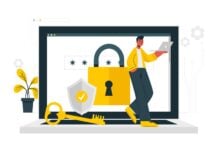Antiviruses are the most reliable software because its primary purpose is to protect your computer from malware. However, when it comes to antivirus protection, your security program may send more data than you want.
Let us examine the current status of antivirus data protection and the handling of your data.
Three ways your Antivirus can infiltrate your privacy
The data behind these cases comes from Restore Privacy, an organization that helps people protect their privacy. They released a report titled “Is Your Antivirus Software Spying On You?” This is where the information about how the Antivirus tracks it is collected.
1. Antivirus programs have sold user data in the past
One of the most significant data protection disruptions in 2020 was Avast’s sale of click information to third parties. Avast’s tracking data was anonymized, but the companies that purchased the data we’re able to compare the click records with activity records on their website. In this way, companies could find out who was in the newspapers.
This type of scandal occurs with antivirus protection programs that offer a free version of their software. This is how these companies generally make their money by selling user information to interested third parties.
2. Antivirus can take a look at your HTTPS data
The antivirus program protects you from visiting malicious websites. To do this, you must see what you are visiting. When you visit an HTTPS website, it becomes a problem because your computer encrypts the data before your Antivirus can access it.
Antivirus programs solve this problem by creating a proxy on your computer that can help in creating fake SSL licenses. When your PC connects to an HTTPS website, the proxy accesses it, verifies the URL, and sends it to the destination with a new license.
You can see this process in the certificate itself. Click on the padlock next to an HTTPS website, check the license, and see who “issued” it. If the name of your antivirus displays, it means that your security software is monitoring your traffic.
3. Antivirus programs may include additional programs that follow you
Some antivirus programs have other tools that allow you to browse safely. These are Potentially Unwanted Programs (PUPs) that can lead to a privacy violation.
The previous report mentions AVG, which comes with a PUP called SafePrice. They supposedly offer you the best prices on products on the web, with the disadvantage that SafePrice tracks your spending habits.
There are several ways to track antivirus programs. Depending on which PUP you install and how you use them, you can transfer data through multiple channels.
Why do virus protection programs want to collect your data?
Data means a lot to companies these days. If an online service offers its platform for free and without advertising, there are not many sales options available. Therefore, you have to sell the collected data to third parties who are interested in obtaining information.
Data collection is a common phenomenon these days. Facebook is the best-known example of collecting personal information and using it for useful purposes. This is the time when people model electoral victory using Facebook data.
One of the main mantras of free software is: “If you don’t pay for the product, you are the product.” Therefore, some people are not at all surprised that free antivirus programs collect information. How else would companies pay their employees?
However, the idea of collecting antivirus data worries people. A good quality antivirus should protect its users and avoid data breaches. Now we are discovering that even antivirus programs are unreliable, especially previously highly recommended free solutions.
How to avoid a breach in most antiviruses?
Unfortunately, only not using an antivirus program is not the ideal option. It is always good to have a protective layer against viruses and hackers. What can you do with the antivirus programs that exist?
Use paid Antivirus instead of free Antivirus
Using paid antivirus products feels like you’re back in the first place. There are lots of premium antivirus options available, You can evaluate the selected variants here. For years, people have recommended free versions versus paid versions, and now we are paying for our security again. However, the truth is that free antivirus programs have grown to the point that they need to collect data to stay afloat.
Find and customize your free Antivirus
On the contrary, some of them may not be able to afford what premium antivirus programs want. In this case, you should be more selective when choosing your Antivirus.
If you like the look of free Antivirus, read its terms of use and see what they record. Do not blindly click “Next” during installation and disable everything necessary to collect your data. Finally, check the options and remove the default values that may violate your privacy, eg. HTTPS URL Verification.
Verify PUPs during download and installation
When downloading and installing Antivirus, read something to make sure you don’t install a PUP. Read the installation program carefully and do not overwrite the “Next” button beforehand. If you carelessly accelerate an installer, you may inadvertently agree to install the software you don’t want. This, in turn, can take over your privacy and track your activities.
Protect your data on the Internet
Antivirus agents have gained people’s trust as digital gatekeepers. After all, they protect our computers from viruses and stay updated to prevent attacks. However, not everything is functional; Some antivirus programs will collect and sell your data. Pay attention to which Antivirus you choose and which options you activate.
If you want to safeguard your privacy better online, try one of the free anonymous web browsers that hide your data.
The most privacy-friendly Antivirus
Navigating the antivirus privacy minefield is difficult. Are there antivirus programs that protect your data without having to scan the installer and verify all options? Although they are rare, they exist.
First of all, you have Emsisoft. Emsisoft sends home information about your license, computer name, and details of all detected viruses. However, this Antivirus sends nothing else home, making it a great option if you don’t want your Antivirus to control your actions.
The report also recommends ClamAV. ClamAV is a fascinating case because the entire program is open source. This means that you can be sure that the AV will not follow you; if it doesn’t, you can always search for the code and check it yourself.
ClamAV is also the rare case of an antivirus program that is free and respects your privacy. Therefore, it is an excellent alternative if you don’t want to pay for an antivirus, but you don’t like the idea of sharing your information.









